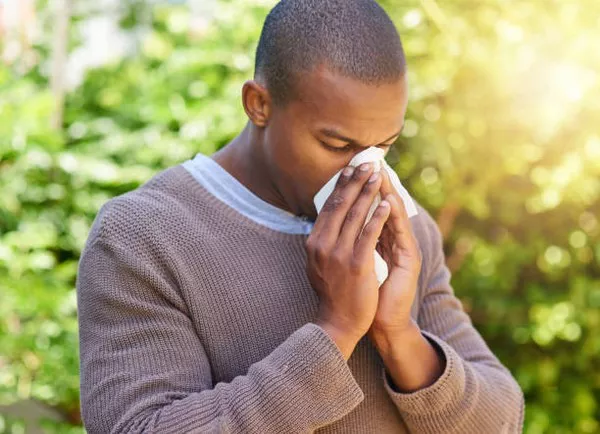Sneezing is a natural reflex that helps the body expel irritants from the nasal passages. While occasional sneezing is normal, experiencing continuous or frequent bouts of sneezing may indicate an underlying health issue. Understanding the potential reasons for continuous sneezing can help individuals identify and address the underlying cause. In this article, we will explore the various factors that can contribute to continuous sneezing and discuss strategies for managing and preventing this bothersome symptom.
Sneezing is a protective mechanism of the respiratory system that helps remove irritants, allergens, and infectious agents from the nasal passages. It involves a sudden expulsion of air from the lungs through the nose and mouth, often accompanied by a characteristic “achoo” sound. While sneezing is typically a temporary and harmless phenomenon, persistent or recurrent sneezing can be disruptive and may signal an underlying health problem.
8 Common Causes of Continuous Sneezing
1. Allergic Rhinitis: Allergic rhinitis, commonly known as hay fever, is one of the most common causes of continuous sneezing. It occurs when the immune system overreacts to allergens such as pollen, dust mites, pet dander, or mold spores. Continuous sneezing is often accompanied by other symptoms such as nasal congestion, runny nose, itching, and watery eyes.
2. Upper Respiratory Infections: Viral or bacterial infections of the upper respiratory tract, such as the common cold or flu, can cause persistent sneezing. These infections irritate the nasal mucosa, leading to inflammation and increased production of mucus. Continuous sneezing may be accompanied by other symptoms such as sore throat, cough, fever, and fatigue.
3. Non-Allergic Rhinitis: Non-allergic rhinitis refers to inflammation of the nasal passages that is not triggered by allergens. This condition can be caused by various factors, including changes in weather, exposure to irritants such as smoke or strong odors, hormonal fluctuations, or certain medications. Continuous sneezing in non-allergic rhinitis is often accompanied by nasal congestion and postnasal drip.
4. Nasal Irritants: Exposure to irritants such as smoke, pollution, chemical fumes, or strong odors can irritate the nasal passages and trigger sneezing. Continuous sneezing may occur in individuals who are sensitive to these irritants or who have underlying respiratory conditions such as asthma or chronic obstructive pulmonary disease (COPD).
5. Vasomotor Rhinitis: Vasomotor rhinitis is a condition characterized by recurrent nasal symptoms, including sneezing, nasal congestion, and runny nose, without an allergic or infectious cause. It is thought to be related to dysfunction of the autonomic nervous system, which regulates nasal blood flow and mucous gland secretion. Triggers for vasomotor rhinitis may include changes in temperature, humidity, or barometric pressure.
6. Medication Side Effects: Certain medications, particularly those that affect the nasal passages or respiratory system, may cause sneezing as a side effect. Examples include nasal decongestants, antihypertensive medications, and medications used to treat erectile dysfunction. If sneezing is a known side effect of a medication, it is important to discuss alternative treatment options with a healthcare provider.
7. Allergic Reactions: In addition to allergic rhinitis, sneezing can also occur as part of a systemic allergic reaction, known as anaphylaxis. Anaphylaxis is a severe and potentially life-threatening allergic reaction that can occur in response to allergens such as insect stings, foods, medications, or latex. Continuous sneezing may be accompanied by other symptoms such as hives, swelling, difficulty breathing, and low blood pressure.
8. Nasal Polyps: Nasal polyps are noncancerous growths that develop in the lining of the nasal passages or sinuses. They can obstruct the nasal airway, leading to symptoms such as nasal congestion, difficulty breathing through the nose, and continuous sneezing. Nasal polyps are often associated with underlying conditions such as allergic rhinitis, asthma, or chronic sinusitis.
Diagnosis and Treatment
Diagnosing the underlying cause of continuous sneezing typically involves a comprehensive evaluation of medical history, physical examination, and diagnostic tests. Depending on the suspected cause, healthcare providers may recommend the following approaches for managing and treating continuous sneezing:
Allergy Testing: Allergy testing, such as skin prick tests or blood tests, can help identify specific allergens that trigger allergic reactions. Avoiding allergens and implementing allergen avoidance measures, such as using air purifiers or allergen-proof bedding, may help reduce sneezing in individuals with allergic rhinitis.
Nasal Irrigation: Nasal irrigation with saline solution can help rinse irritants, allergens, and excess mucus from the nasal passages, providing symptomatic relief for continuous sneezing and nasal congestion.
Medications: Depending on the underlying cause, healthcare providers may prescribe medications to alleviate symptoms of continuous sneezing. These may include antihistamines, nasal corticosteroids, decongestants, nasal anticholinergics, or leukotriene receptor antagonists.
Immunotherapy: For individuals with severe allergic rhinitis that does not respond to other treatments, allergen immunotherapy may be recommended. This involves gradually exposing the individual to increasing doses of allergens to desensitize the immune system and reduce allergic reactions.
Surgery: In cases where nasal polyps or structural abnormalities contribute to continuous sneezing, surgical intervention may be necessary to remove the obstruction and improve nasal airflow.
Lifestyle Modifications: Making lifestyle changes such as avoiding tobacco smoke, minimizing exposure to environmental irritants, maintaining optimal indoor humidity levels, and practicing good hygiene habits can help reduce the frequency and severity of continuous sneezing episodes.
See Also: 6 Effective Strategies to Halt Sneezing Naturally
Conclusion
Continuous sneezing can be a bothersome symptom that interferes with daily activities and quality of life. Identifying the underlying cause of continuous sneezing is essential for effective management and treatment. By understanding the potential triggers and implementing appropriate interventions, individuals can alleviate symptoms, improve nasal health, and enjoy a better quality of life. If continuous sneezing persists or is accompanied by other concerning symptoms, it is important to consult a healthcare provider for proper evaluation and management.


